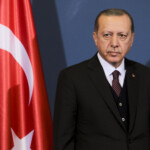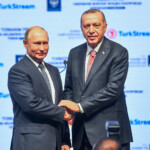Erdoğan’s voters don’t believe that they live in a dictatorship. They believe that what they have now, because of Erdoğan, is a democracy—that they, the voters, in exercising their right to vote, have participated in one of the greatest democratic experiments in recent history.
The opposition’s optimism had largely flamed out after the strong showing of Erdoğan’s party—the Justice and Development Party, or A.K.P.—on May 14th, in the first round, in which Erdoğan led in the Presidential election and his main right-wing ally (the Nationalist Movement Party) triumphed in parliament.
That was enough to put the wind at Erdoğan’s back for the runoff, against Kemal Kılıçdaroğlu, but he hardly needed wind. The advantages accrued by a canny, cruel, autocratic leader of twenty years could overwhelm even the most charismatic challenger: there were pre-election giveaways of cheaper electricity and gas, timely surges in wages for civil servants, decades of charity to the poor, and almost total control of the media, which has occluded the causes of Turkey’s devastating recent earthquake. Erdoğan has jailed and persecuted thousands of dissidents, delivered inflammatory rhetoric about the opposition’s association with the L.G.B.T.Q. community, and painted Kurds as allied with terrorists—including a mendacious montage video claiming that the P.K.K., a Kurdish militant group, supported Kılıçdaroğlu.
In an interview, Erdoğan defended the video: its veracity was irrelevant, he argued, capturing an era.
Kılıçdaroğlu, the stubborn head of Turkey’s oldest party, the Republican People’s Party, or C.H.P., isn’t a charismatic leader, and his party has no recent record of governance to stand on. But, in the months before the elections, Kılıçdaroğlu’s conciliatory nature and his inclusive rhetoric inspired many to believe that he could somehow bring the varied groups of the opposition together.
When he fell short of a majority, in the first round, he abandoned his softness. After a rabidly anti-migrant third place candidate, Sinan Oğan, secured five per cent of the vote, Kılıçdaroğlu reiterated, “The border is honor.” Billboards appeared all over Istanbul with Kılıçdaroğlu’s face and the words “The Syrians. Will. Go.” A recent poll suggested that seventy-one per cent of Turks wanted the Syrians repatriated—this has been clear especially since 2019, when the refugee issue helped lose the Istanbul mayoral elections for the A.K.P. (Erdoğan had welcomed the Syrians, in 2012.) But Kılıçdaroğlu, after all the months of sweetness and inclusivity, suddenly sounded not only violent but disingenuous.
This election was always going to be tricky for Kılıçdaroğlu: he was representing a six-party umbrella movement, one that included former AKP conservatives, right-wing nationalists, secularists, leftist liberals, and, unofficially, much of the Kurdish left.
The opposition—the people themselves—who monitored the voting in classrooms, who posted videos of voter intimidation on Twitter, or worked together to assess election irregularities, have somehow not given up hope or energy in the past twenty years.
But we will see many people leave Turkey in the next year—those with opportunities abroad, but also those under threat, especially people facing trumped-up charges of terrorism.
On the night of the election, Erdoğan said that he would not let the Kurdish politician Selahattin Demirtaş (whose party was threatened with closure before the elections) out of jail. The crowd chanted, “Selo’ya idam”—execution for Demirtaş.
Those who stay in Turkey will live in a country on the brink of economic ruin. The people will suffer, but Erdoğan’s government will likely be bailed out.
On Sunday and Monday, many opposition Turks responded to the tweets with scorn. When Ursula von der Leyen, the president of the European Commission, tweeted, “I look forward to continue building the EU-Türkiye relationship,” the veteran Turkish journalist Amberin Zaman replied, “And to keeping brown Muslim people out of Europe.”
Turks have been expected to care for a refugee population and a crisis caused by Western wars and Western leaders who are intent on keeping the chaos they’ve caused in the Middle East on the other side of the Bosporus.
Turkey’s geography has proved too big to fail. Erdoğan has continued to make himself important to America as part of nato, even as he has embraced anti-American rhetoric; to Europe, as the strongman-shepherd of Arab and Muslim refugees; and now to Russia, which needs Erdoğan during this time of isolation because of the war in Ukraine, and also for trade, especially in gas and food. Erdoğan benefits from others’ foreign-policy narcissism.
The day after his victory, the front page of the Times website read, “Will Erdoğan’s Victory Soften Turkey’s Opposition to Sweden in NATO?” At the end of the day, it’s not clear that the leaders of the West really wanted Erdoğan to go.
The morning after the election, an American friend said to me, “Crazy that so many countries love their autocrats”. But Erdoğan’s voters don’t believe that they live in a dictatorship. They believe that what they have now, because of Erdoğan, is a democracy—that Erdoğan wouldn’t throw people in jail unless they were guilty, and that they, the voters, in exercising their right to vote, have participated in one of the greatest democratic experiments in recent history.
There is a possibility that the winner was, in fact, near-recent history. With voters, the first ten years of Erdoğan’s rule—in which he restored the dignity of religious people, and improved the health-care system, public services, and much civil infrastructure—may carry more power than the second ten, in which he engaged in unfathomable corruption, oppressed a large proportion of the citizenry, and squandered the people’s money.
This is a shortened version of an article originally published in the New Yorker. Click here for the full version.
The views and opinions expressed above are the author’s and do not represent those of the Free Turkish Press.


